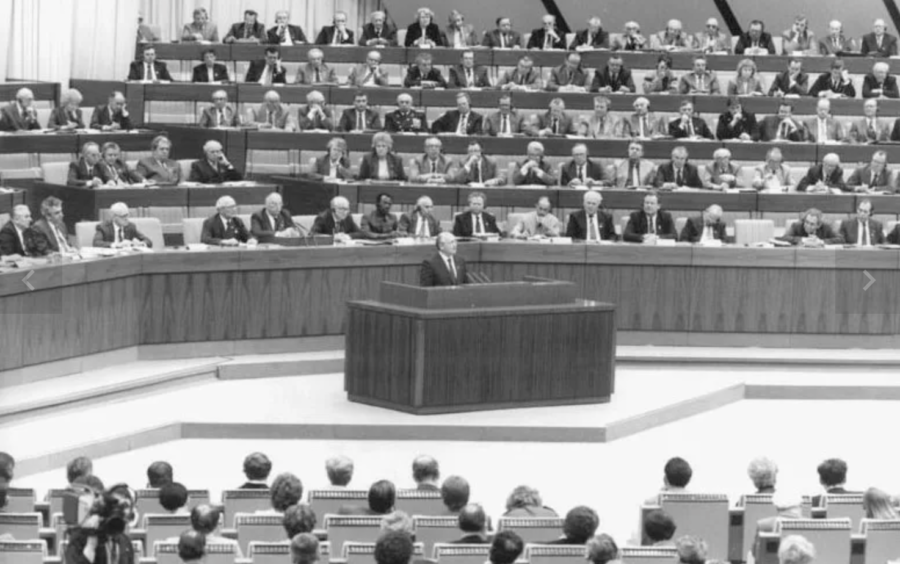Mikhail Gorbachev: Life and Legacy
Gorbachev addresses the attendees of the 11th congress of the Socialist Unity party of Germany in April 1986.
On August 30, 2022, the world saw the passing of one of the most influential leaders of the Cold War: the last leader of the Soviet Union Mikhail Gorbachev.
Born to peasants in 1931, Gorbachev grew up during the turbulent era of Joseph Stalin’s rule. He attended the prestigious Moscow University, graduating with a law degree in 1955. During his time at university, he became a full member of the Communist Party and rose through the ranks of the party after graduating. By 1980, he assumed membership in the Politburo, the supreme law making body of the Communist Party.
His success within the party could be partially attributed to his mentor, Mikhail Suslov, a prominent ideologue for the Communist party at the time. Under Suslov’s guidance, Gorbachev became a leading member of the Politburo, setting the stage for his election to the office of General Secretary of the party in 1985.
Once at the head of the Communist Party, Gorbachev worked on promoting reforms to enhance the lives of Soviet citizens. His two most noteworthy reforms were in the form of “glasnost” and “perestroika.”
Aiming for social reform, the policy of “glasnost” brought a new degree of transparency to the Soviet government. Gorbachev — sponsoring a democratic shift in Soviet culture — encouraged freedom of expression, involved more individuals in the political process, and reduced shackles on the press. This effort to “democratize” the Soviet Union clashed with bureaucratic aims to maintain the oppressive status quo.
On the economic side, Gorbachev pursued policy that increased capital investment, stimulating the static economy at the time. His policy of “perestroika,” meaning “reconstruction”, entailed the ending of Soviet central planning. In an effort to elevate the Soviet economy to match the powerful Western economy, Gorbachev attempted to establish a partially free market economy. However, this attempt failed due to the incompatibility of Soviet economic planning and the West’s free market economies.
In terms of foreign affairs, Gorbachev played a crucial role in ending the Cold War. Filling the office of Chairman of the Presidium, he further consolidated his power. During the Revolutions of 1989, Communist regimes across the eastern Soviet-bloc fell, and Gorbachev gradually withdrew troops from these regions. Supporting the reunification of Germany, he gave up many territorial concessions in an effort to achieve peace. His efforts were recognized, with him receiving the Nobel Peace Prize in 1990.
Assuming the newly created office of the President of the USSR, Gorbachev used his extensive executive power to further tear down the totalitarian fabric of the Soviet Union, laying the foundation for representative democracy. Once Boris Yeltsin was elected as president of Russia in 1991, Communist rule in the Soviet Union swiftly ended, and after an attempted coup, an essentially powerless Gorbachev completely resigned from his presidency.
Gorbachev’s legacy lies in his complexity. The anti-Soviet product of a Soviet system, Gorbachev aimed to weaken the Soviet apparatus of government, replacing Communist values with those of democracy. As a visionary of freedom in Russia, his decisions, although abhorred by Russian leaders today, were part of a larger plan to integrate Russia into the democratic workings of the Western World.
Anant Srinivasan is a senior at Wilton High School and a Managing Editor for the Forum. His interests range from programming to history and politics, and he is eager to share his writing with the Wilton community.

